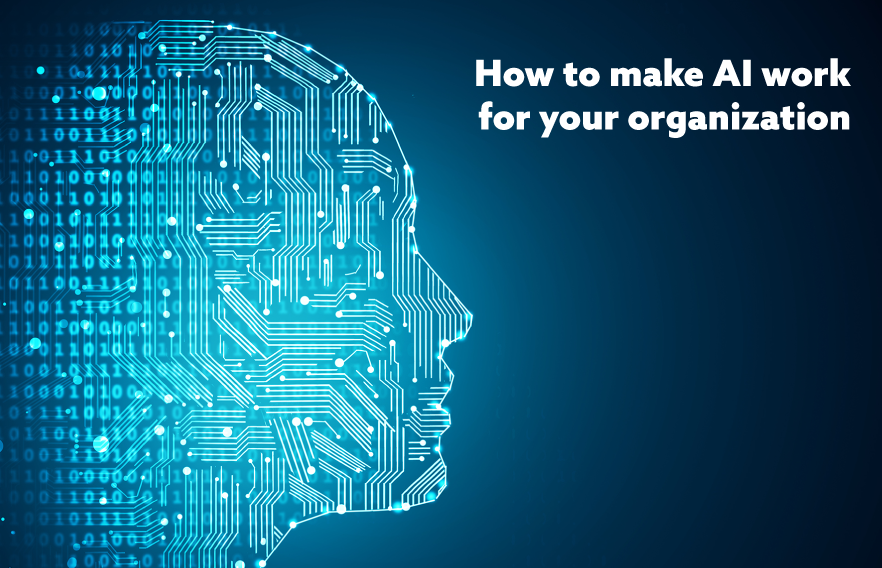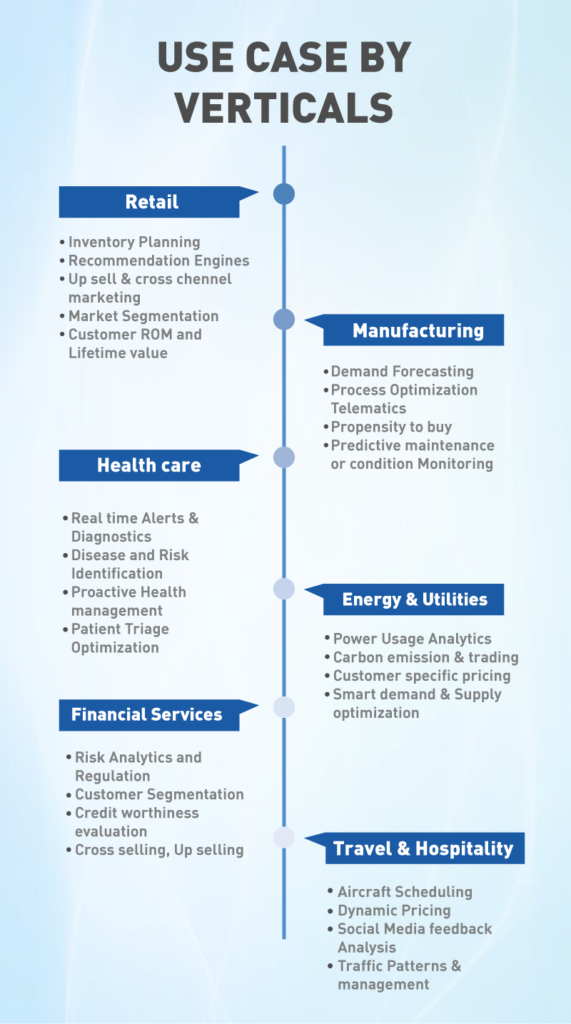Artificial Intelligence (AI) is poised to have a transformational impact on business. Information technology is no longer just about process automation and codifying business logic. Instead, insight is the new currency, and the speed with which we can scale that insight and the knowledge it brings is the basis for value creation and the key to competitive advantage. According to Gartner, AI will be one of the top five investment priorities for more than 30% of CIOs globally, by 2020. Many organizations are still early in their data science journey and are trying to understand how AI can transform their businesses.
What is Artificial Intelligence?
Artificial Intelligence (AI) makes it possible for machines to learn from experience, adapt to new inputs and perform human-like tasks. AI works by combining large amounts of data with fast, iterative processing and intelligent algorithms, allowing the software to learn automatically by recognizing patterns in the data. Forms of AI in use today include, among others, digital assistants, chatbots and robots.
AI includes many methods and continuously evolving range of technologies, as well as the following major subfields:
- Machine Learning (ML) uses neural networks and statistical analysis to find hidden insights in data without explicitly being programmed for where to look or what to conclude. It automates building analytical models.
- Natural Language Processing (NLP) is the ability of computers to analyze, understand and generate human language, including speech.
- Deep Learning (DL) is a variation of machine learning – it involves the ability of machines to develop self-learning capabilities from large amounts of data using huge neural networks with many layers of processing units. Common applications include image and speech recognition.
Why Artificial Intelligence is important
The true promise of AI is to unleash actionable insights that would otherwise be trapped in massive amounts of data. Much of that data is unstructured data – data that’s generated by written reports and business documents, videos, photos, social media posts or even e-mail messages.
With artificial intelligence, we can build thousands of computers that could all work in unison to solve our most complex problems. It is also capable of seeing patterns in data that even trained professionals don’t always catch.
Artificial intelligence and machine learning technologies can automate important, but manual and time-consuming tasks, allowing employees to focus on higher-value work. AI will be used to extract new insights, transform decision making and drive improved business outcomes. A recent PwC report indicates that an overwhelming 72% of business decision makers believe that AI provides a competitive edge on the business front.
Early adoption of artificial intelligence for specific, clearly defined applications enables forward-looking organizations to create significant business value and, ultimately, to set the stage for transforming business models and processes.
Artificial intelligence in businesses can be used to:
- Increase competitive advantage and improve efficiency
- Advance automated interactions with customers, partners and workers
- Multiply productivity gains by automating processes
- Power smarter machinery, vehicles and structures
- Enhance customer intimacy and thereby increase consumer demand
- Improve analysis of video and audio in real-time
Applications of AI & ML
From image and speech recognition, medical diagnosis, and self-driving vehicles to personalized healthcare, there are many possible applications of artificial intelligence and machine learning across industries:
- Fraud detection: Ability to compare millions of transactions and distinguish precisely between legitimate and fraudulent transactions
- Data Security: Identify patterns in how data in the cloud is accessed, and report anomalies that could predict security breaches
- Marketing: Helps to increase the likelihood of a user clicking by programming targeted ads and optimizing what product mix to display
- Recommendations: Ability to determine what you might like to buy or binge watch next by analysing millions of other users
- Security screening: Eliminate false alarms and spot things human screeners might miss in security screenings to ensure safer events
- Online search: Google and its competitors are constantly improving what the search engine understands to deliver a better result in the future
- Language mining: Language processing can stand in for customer service agents and more quickly route customers to the required information
Let’s take a look at some applications of machine learning in three key industries:
Retail
Machine learning algorithms are being used by online retailers in ways given below.
- Online recommendation engine allows retailers to offer personalized promotions or user experience based on customer’s previous purchases or activities
- Better customer service and delivery systems is possible using smart machines which can reduce response time and support in situations where resources are less
- Monitoring price changes over a certain period of time enables ecommerce companies to track patterns in these fluctuations and set prices according to demand
Financial Services
The transformative potential of machine learning is compelling the financial services industry to adopt it with vigour. Machine learning can help banks, insurers, and investors make smarter decisions in a number of different areas:
- Managing client satisfaction
- Reacting to market trends
- Predicting risk
- Innovate to stay competitive
The Banking and Finance (BFSI) sector is taking the help of artificial intelligence to manage the vast amount of data that is getting generated and detecting the anomalies in transaction or frauds. Financial institutions are increasingly depending on machine learning for portfolio management like forecasting trading volatility and managing wealth and assets. These algorithms can identify trends more efficiently than humans and react in real-time.
Healthcare
Organizations can capitalise on the intersection between Internet of Things (IoT) and data analytics to enable smarter healthcare solutions.
- Robot assisted surgeries are becoming more common. They are not only more precise, but have a higher success rate with quicker recovery and smaller surgery scars
- Personalized health monitoring using smart watches and other wearable devices have made health telemetry a reality
How to get started with AI
AI initiatives should be linked to specific, well-scoped opportunities, problems and issues to have maximum impact. To initiate AI based automation in your business, here are a few pointers:
- Start by identifying the problem and defining where you can use AI to improve efficiency
- Identify the data source and focus on collecting the data from the relevant touchpoints
- Develop an AI-based solution to aid algorithmic decision making
- Once the solution is developed, implement the same and provide necessary training
Conclusion
The effects of AI will be magnified in the coming decade, as virtually every industry will transform their core processes and business models to take advantage of artificial intelligence and machine learning. The bottleneck now is in business imagination, implementation, and management. For business leaders, it is imperative to get a plan for making AI work in the organization. Initial AI projects may get delayed or underdeliver, but the risk of businesses becoming non-competitive by ignoring AI is high.
To know how LatentView can help you leverage Artificial Intelligence and Machine Learning in your digital transformation journey, do write to: marketing@latentview.com




